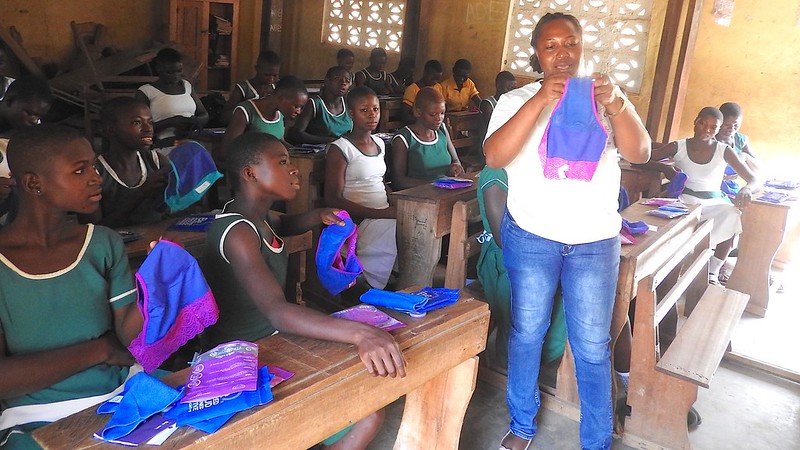Menstrual Hygiene Taxes and Tariffs in Ethiopia
Menstrual hygiene products are, for many millions of menstruators worldwide, unaffordable and inaccessible. From the so-called tampon tax in the United States, to import tariffs on plastic used to line disposable pads, government tax policies have long been a target of campaigns to make menstrual health and hygiene (MHH) a priority.
In late 2020, USAID celebrated with partners and stakeholders a long-awaited victory: Ethiopia’s Ministry of Finance announced that it would be removing taxes on the local manufacture of menstrual hygiene (MH) products, and cutting import taxes on these products from 30 percent to 10 percent. In doing so, Ethiopia joined other countries, such as Bangladesh, Kenya, and Nigeria, in making these vital products more accessible.
An estimated 500 million people do not have everything they need to manage their menstruation. This unmet need may reflect lack of information, products, or sanitation infrastructure—or too often, all three. Underlying these gaps are harmful social norms, stigmas, and taboos related to menstruation that prevent menstruating women and girls from living a full and productive life—such as by discouraging them from attending school, work, harvests, or markets, and blocking their access to essential resources, such as water and food. For example, in Ethiopia, there is a strong culture of shame and silence around menstruation, with many associating first menses with sexual activity or a sign of maturity and readiness for marriage. Harassment, teasing, lack of appropriate facilities and pain management are key factors for non-attendance in school.
Many countries also lack a holistic policy framework for menstrual health and hygiene that addresses the gender and social norms and gaps in information, health, sanitation, and products. Transactional sex for menstrual hygiene supplies is believed to be a common but poorly understood phenomenon, and access to menstrual hygiene supplies is currently suffering even more than usual under the strain of COVID-19. There is a long way to go before all menstruators feel safe, supported, informed, and able to manage their needs no matter where they go in their communities without it creating undue discomfort or indignities.
Making menstrual hygiene supplies more affordable is a critical piece of these complicated, structural issues. To meet this challenge, USAID is testing and developing market-based sanitation, including MHH products, in Ethiopia through Transform WASH, a five-year, $24 million investment. In the country, an estimated 24.1 million girls and women are of reproductive age, and only 28 percent of them report having everything they need to manage their menstruation. To close this gap, USAID is working with local entrepreneurs and importers to introduce profitable, yet affordable, reusable sanitary pads to increase women’s MHH product choices. USAID and Transform WASH implementing partners have long urged for additional measures to stimulate the Ethiopian sanitation and hygiene manufacturing market and encourage the government to make it easier and more profitable for local companies to manufacture and sell these pads.

Menstrual hygiene products, such as the “period panty” depicted in the photo above, are essential for young women to fully participate in society. Photo by USAID WASH for Health/Global Communities.
The Bill and Melinda Gates Foundation recently commissioned a study to explore the impact of menstrual hygiene product tax cuts on MHH. Analysis from four countries that have lifted taxes and tariffs like Ethiopia has found that the overall impact on product affordability was limited. Where there was greater market competition among local manufacturers, reduced taxes apparently had a greater benefit.
However, the analysis pointed to an even stronger benefit: menstrual hygiene tax advocacy campaigns also increased general awareness of MHH, thus combating stigma and opening dialogue that may yield a more holistic response. In other words, despite evidence that reducing or ending MH taxes will not in itself provide MHH for all menstruators, efforts to address MH taxes are a valuable component of broader awareness-raising and policy reform efforts and a useful entry point to building political will that civil society and donors should consider prioritizing.
USAID tackles MHH as a multi-sectoral issue, drawing on expertise in gender equality, adolescent girls, reproductive health, social and behavior change, sanitation and hygiene, women’s economic empowerment, and governance. Increasingly, USAID’s gender-focused water, sanitation and hygiene (WASH) activities are focusing on empowering female entrepreneurs with training, financial literacy, and improved access to banking products, in addition to prioritizing policy reform that more explicitly meets the needs of women and girls. MHH is not a WASH sector issue, but the WASH sector has, and will continue to, provide leadership and coordination and we’re proud that our WASH activity in Ethiopia has given MHH champions something we can all celebrate.
By Lisa Schechtman, Senior Policy and Partnerships Advisor, USAID Center for Water Security, Sanitation and Hygiene; and Kathrin Tegenfeldt, USAID Climate and WASH Advisor, Economic Growth and Transformation Office, Ethiopia.


